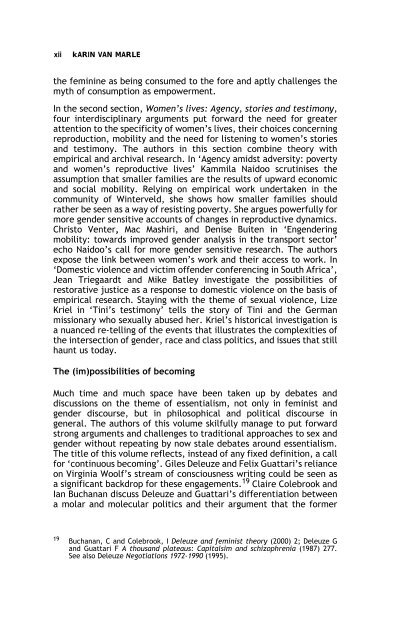Sex, Gender, Becoming - PULP
Sex, Gender, Becoming - PULP
Sex, Gender, Becoming - PULP
Create successful ePaper yourself
Turn your PDF publications into a flip-book with our unique Google optimized e-Paper software.
xii<br />
kARIN VAN MARLE<br />
the feminine as being consumed to the fore and aptly challenges the<br />
myth of consumption as empowerment.<br />
In the second section, Women’s lives: Agency, stories and testimony,<br />
four interdisciplinary arguments put forward the need for greater<br />
attention to the specificity of women’s lives, their choices concerning<br />
reproduction, mobility and the need for listening to women’s stories<br />
and testimony. The authors in this section combine theory with<br />
empirical and archival research. In ‘Agency amidst adversity: poverty<br />
and women’s reproductive lives’ Kammila Naidoo scrutinises the<br />
assumption that smaller families are the results of upward economic<br />
and social mobility. Relying on empirical work undertaken in the<br />
community of Winterveld, she shows how smaller families should<br />
rather be seen as a way of resisting poverty. She argues powerfully for<br />
more gender sensitive accounts of changes in reproductive dynamics.<br />
Christo Venter, Mac Mashiri, and Denise Buiten in ‘Engendering<br />
mobility: towards improved gender analysis in the transport sector’<br />
echo Naidoo’s call for more gender sensitive research. The authors<br />
expose the link between women’s work and their access to work. In<br />
‘Domestic violence and victim offender conferencing in South Africa’,<br />
Jean Triegaardt and Mike Batley investigate the possibilities of<br />
restorative justice as a response to domestic violence on the basis of<br />
empirical research. Staying with the theme of sexual violence, Lize<br />
Kriel in ‘Tini’s testimony’ tells the story of Tini and the German<br />
missionary who sexually abused her. Kriel’s historical investigation is<br />
a nuanced re-telling of the events that illustrates the complexities of<br />
the intersection of gender, race and class politics, and issues that still<br />
haunt us today.<br />
The (im)possibilities of becoming<br />
Much time and much space have been taken up by debates and<br />
discussions on the theme of essentialism, not only in feminist and<br />
gender discourse, but in philosophical and political discourse in<br />
general. The authors of this volume skilfully manage to put forward<br />
strong arguments and challenges to traditional approaches to sex and<br />
gender without repeating by now stale debates around essentialism.<br />
The title of this volume reflects, instead of any fixed definition, a call<br />
for ‘continuous becoming’. Giles Deleuze and Felix Guattari’s reliance<br />
on Virginia Woolf’s stream of consciousness writing could be seen as<br />
a significant backdrop for these engagements. 19 Claire Colebrook and<br />
Ian Buchanan discuss Deleuze and Guattari’s differentiation between<br />
a molar and molecular politics and their argument that the former<br />
19 Buchanan, C and Colebrook, I Deleuze and feminist theory (2000) 2; Deleuze G<br />
and Guattari F A thousand plateaus: Capitalsim and schizophrenia (1987) 277.<br />
See also Deleuze Negotiations 1972-1990 (1995).
















